|
83 Biggin Street
 
84 Biggin Street

86 Biggin Street in 1899

Dover
01304 204272.
https://princealbert-dover.craftunionpubs.com
https://www.facebook.com/The-Prince-Albert
https://whatpub.com/prince-albert
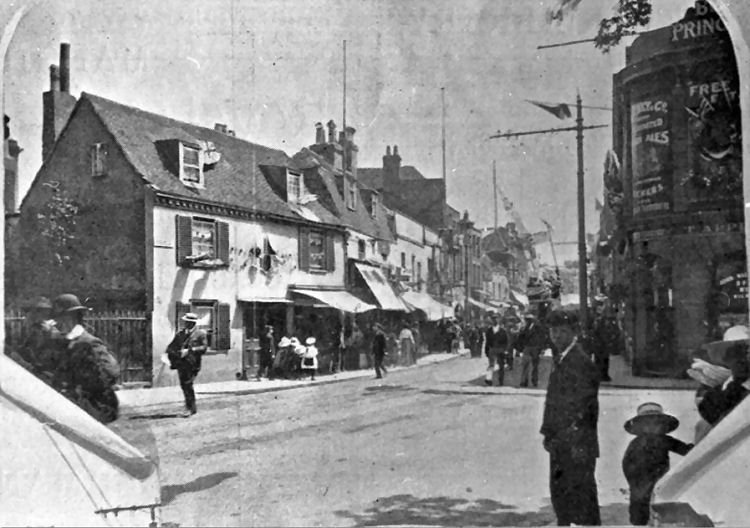
Above photo circa 1910, kindly sent by Paul Wells. |
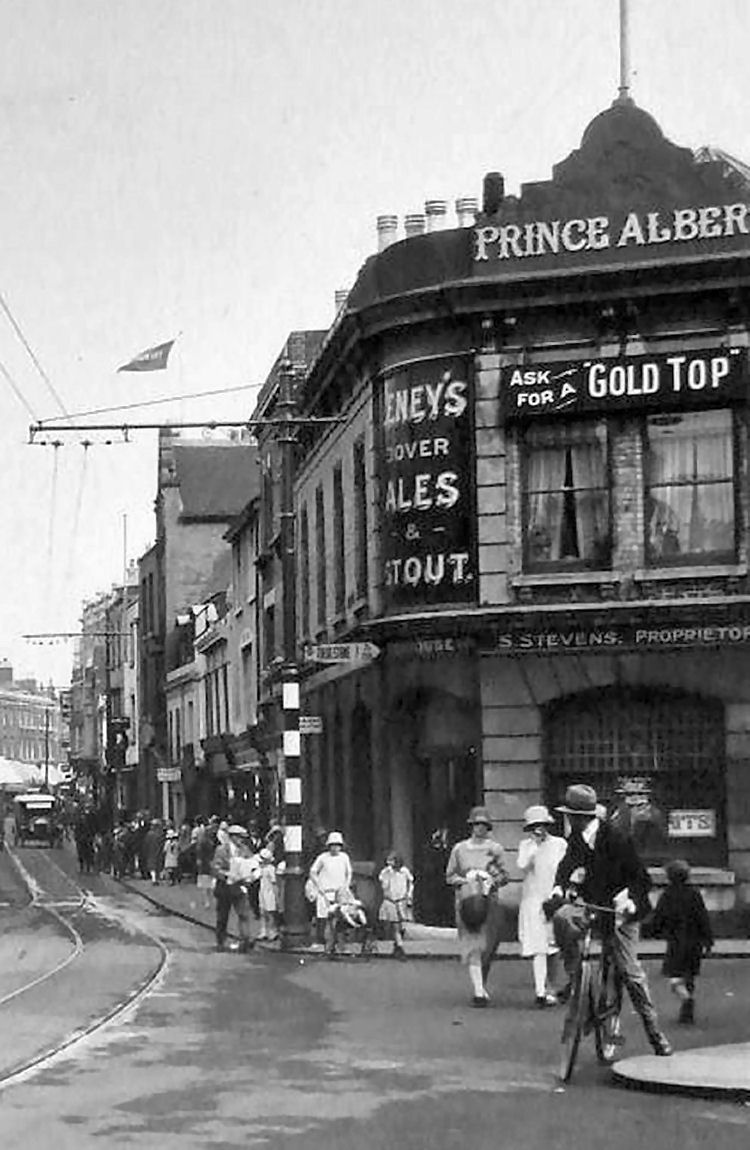
Above photo showing the pub circa 1927. |
|
Photo taken from
https://www.facebook.com
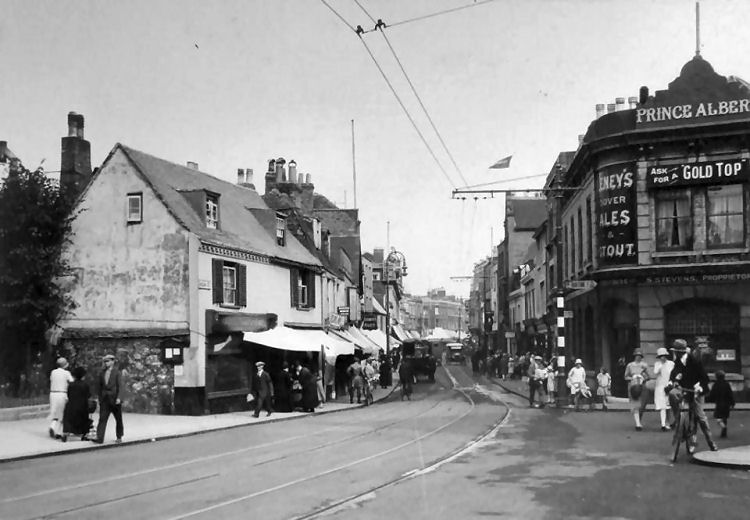
Above photograph shows the "Prince Albert" right, and also just in
shot, the sign for the old "Salutation,"
taken circa 1930. |
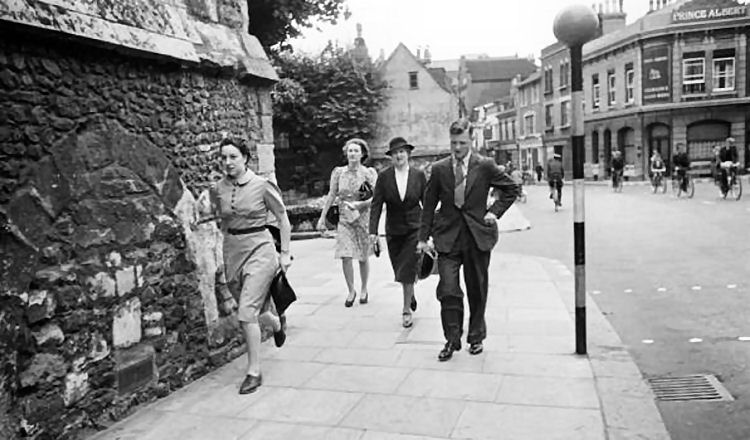
Above photo 1940, kindly sent by Rory Kehoe. As the siren sounds,
pedestrians hurry for cover from a Luftwaffe raid during the Battle of
Britain. |
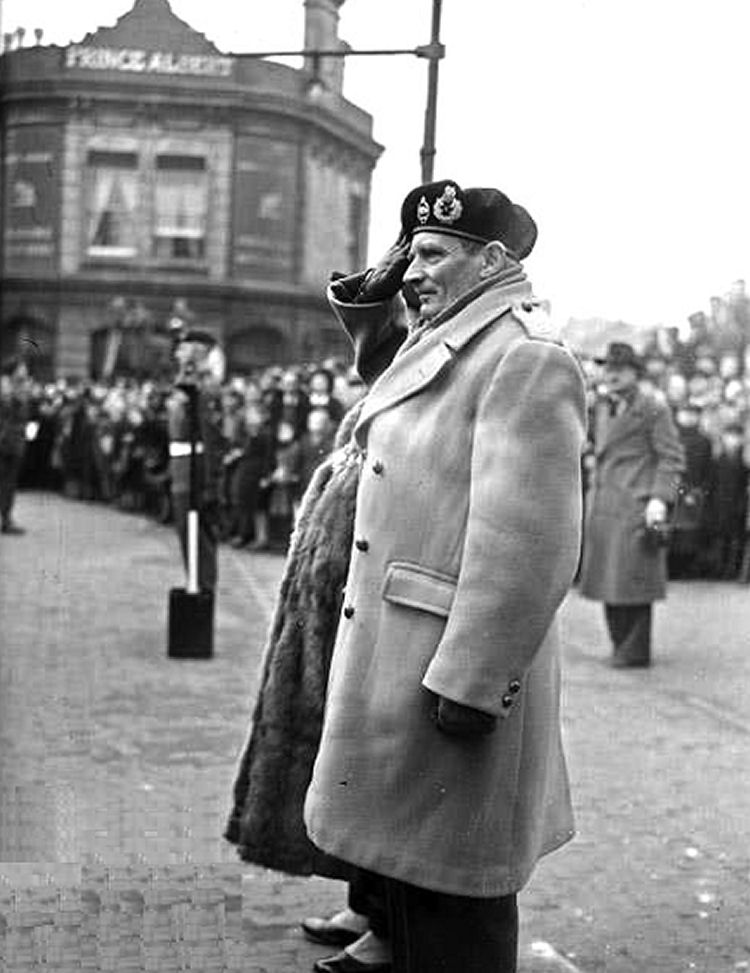
Above photo, April 1946. Kindly sent by Rory Kehoe. Field Marshal
Bernard Law Montgomery taking the salute at the Dover War Memorial,
accompanied by the Mayor, Arther T Goodfellow. During his visit, Monty
was granted the freedom of Dover. |
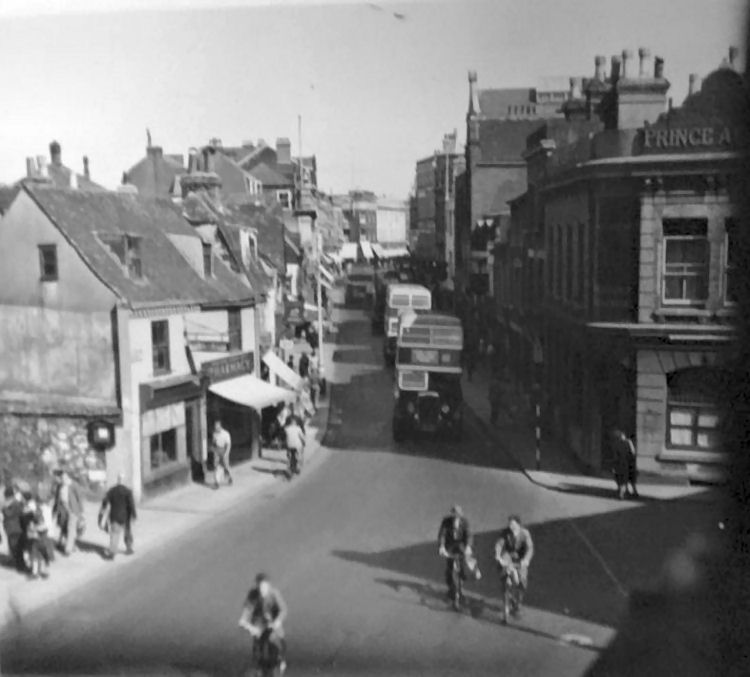
Above photo from the John Gilham collection, circa 1950. |

Above photo circa 1950. |
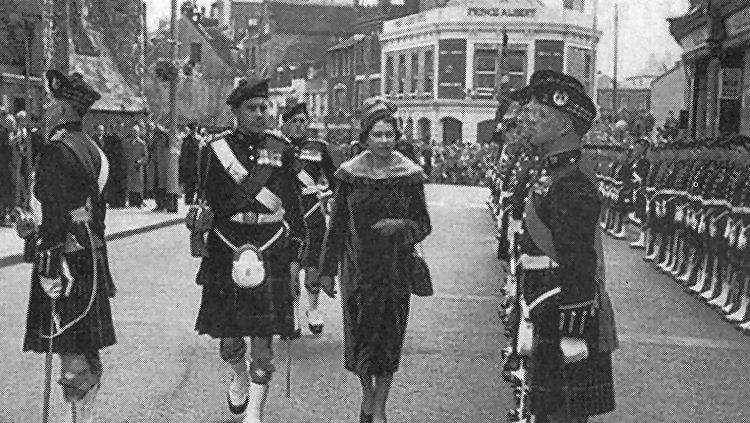
The Queen passing through in 1958. |
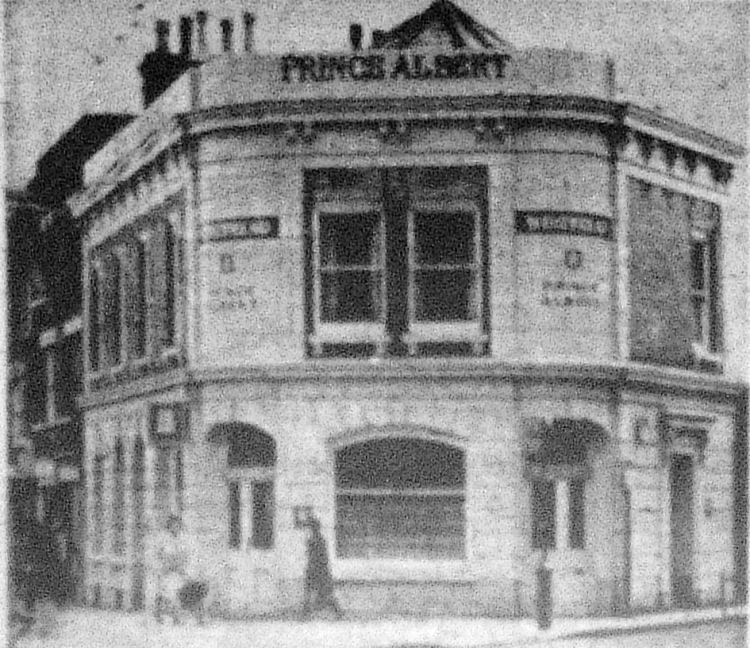
Above photograph shows the "Prince Albert" 1970. |
|
From an article in the Dover Mercury 7 January 1999 by Joe Harman.
False rumour of flowing beer in 1889
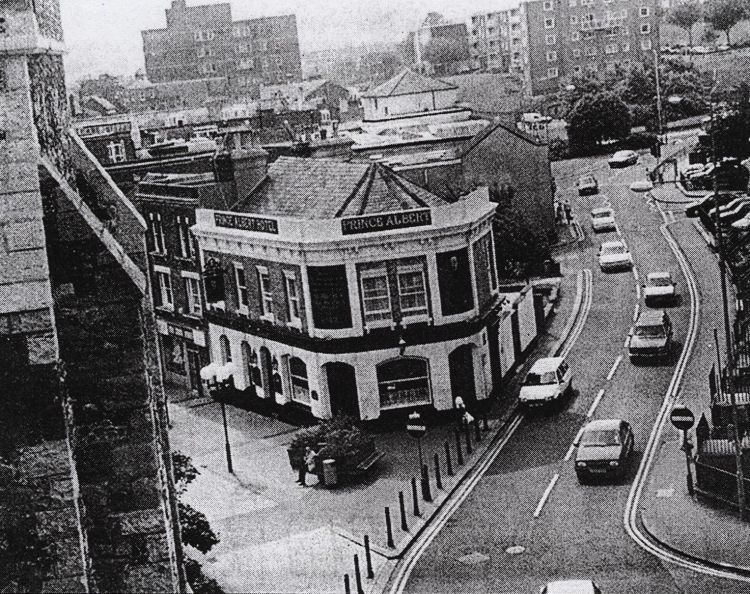 |
|
THE Prince Albert public house in Dover seems to have been listed since
1847, but I have not been able to find an earlier name.
I have found a
licensed victualler in the 1841 census in Biggin Street whom I cannot
relate to any hostelry.
However we do know that a Mr Walker, a local
brewer, lived in a house here and moved away about 1840.
In July 1879,
when it was
being rebuilt, the workmen found complete skeletons which may have
related to the nearby St Edmund's Chapel or an earlier building in this
area.
In October 1889 there was a gas explosion in the cellar which did
considerable damage to the contents but no injury to the staff or
customers apart from shock.
They all piled out into the street and a
large crowd
gathered. Someone started a rumour that beer was running down the street
but it was untrue.
The building was immediately closed for the insurance
agents to come and assess the damage.
The present building seems to date
from the rebuild of 1879 as the cast iron lintels over the upstairs
windows would be of that period.
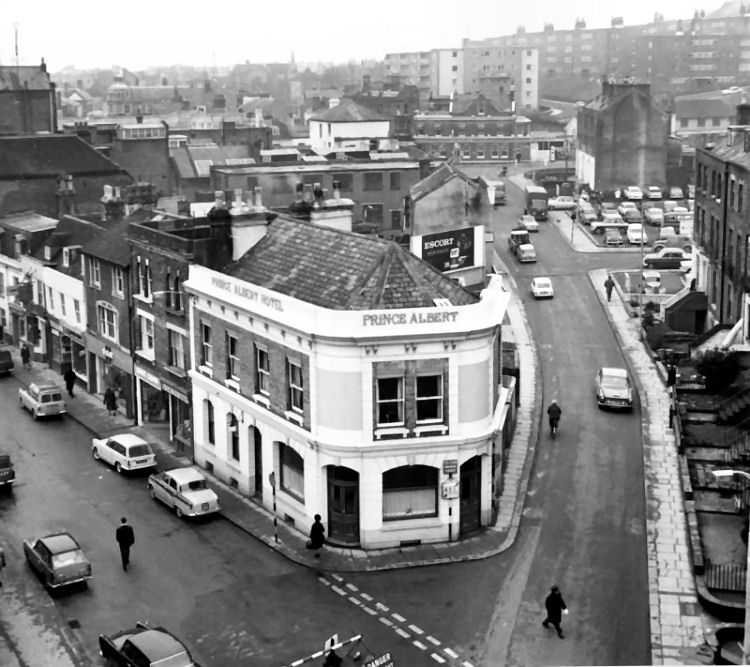
Above showing the "Prince Albert" in 1966.
|
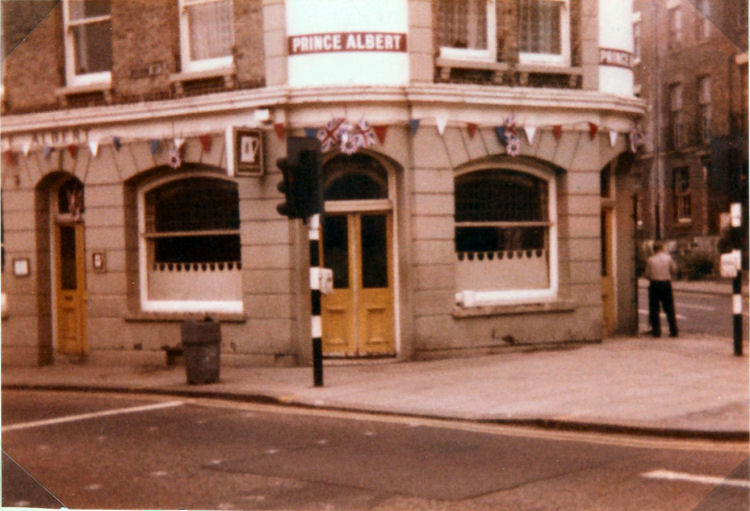
Prince Albert circa 1980 (Photo by Barry Smith) |
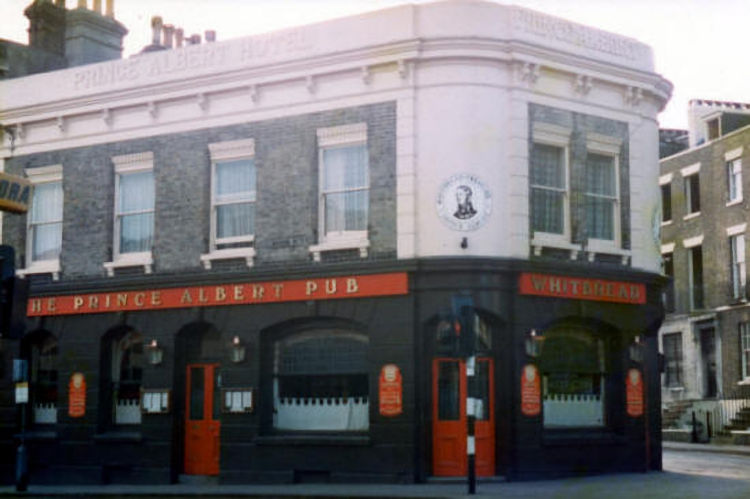
Above photo, 1983. Photo by Eddie Chard. |
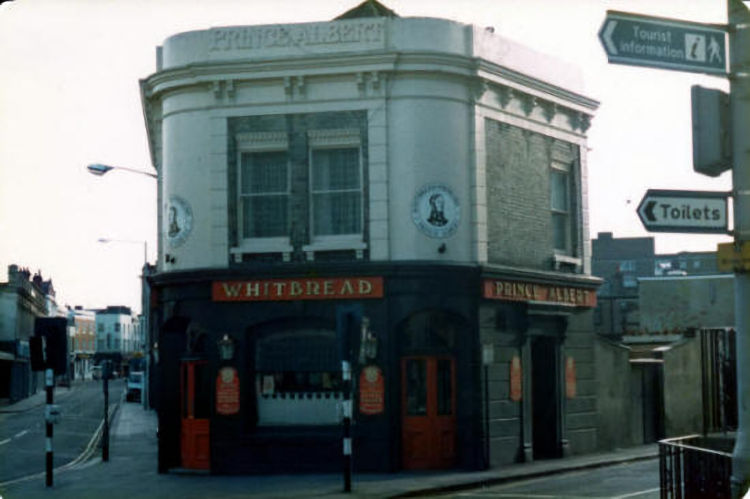
Above photo, 1983. Photo by Eddie Chard. |
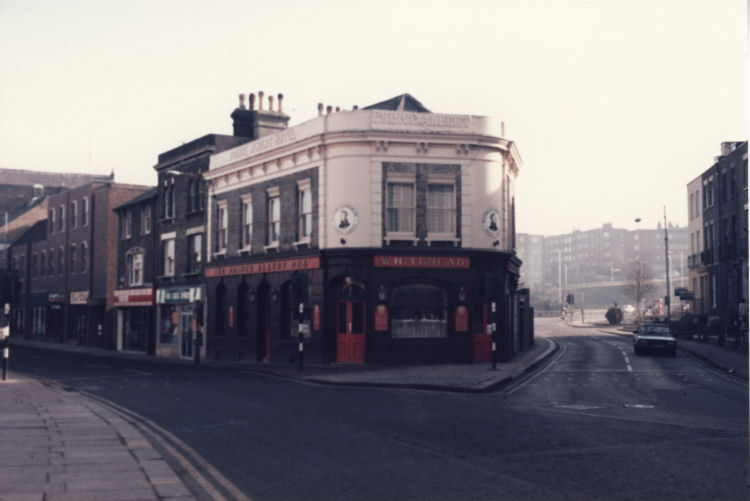
Prince Albert circa 1987 (Photo by Paul Skelton) |
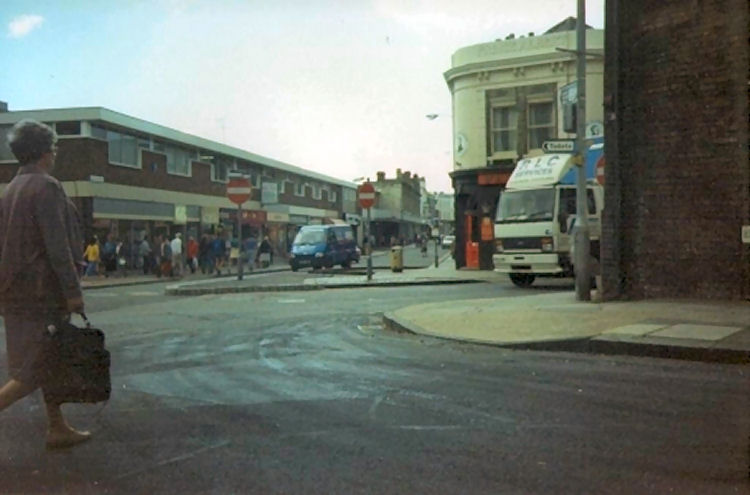
Above photo, 6 June 1988. |
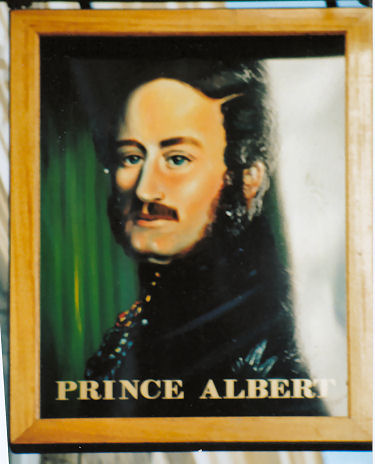
Prince Albert sign October 1991.
Above with thanks from Brian Curtis
www.innsignsociety.com |
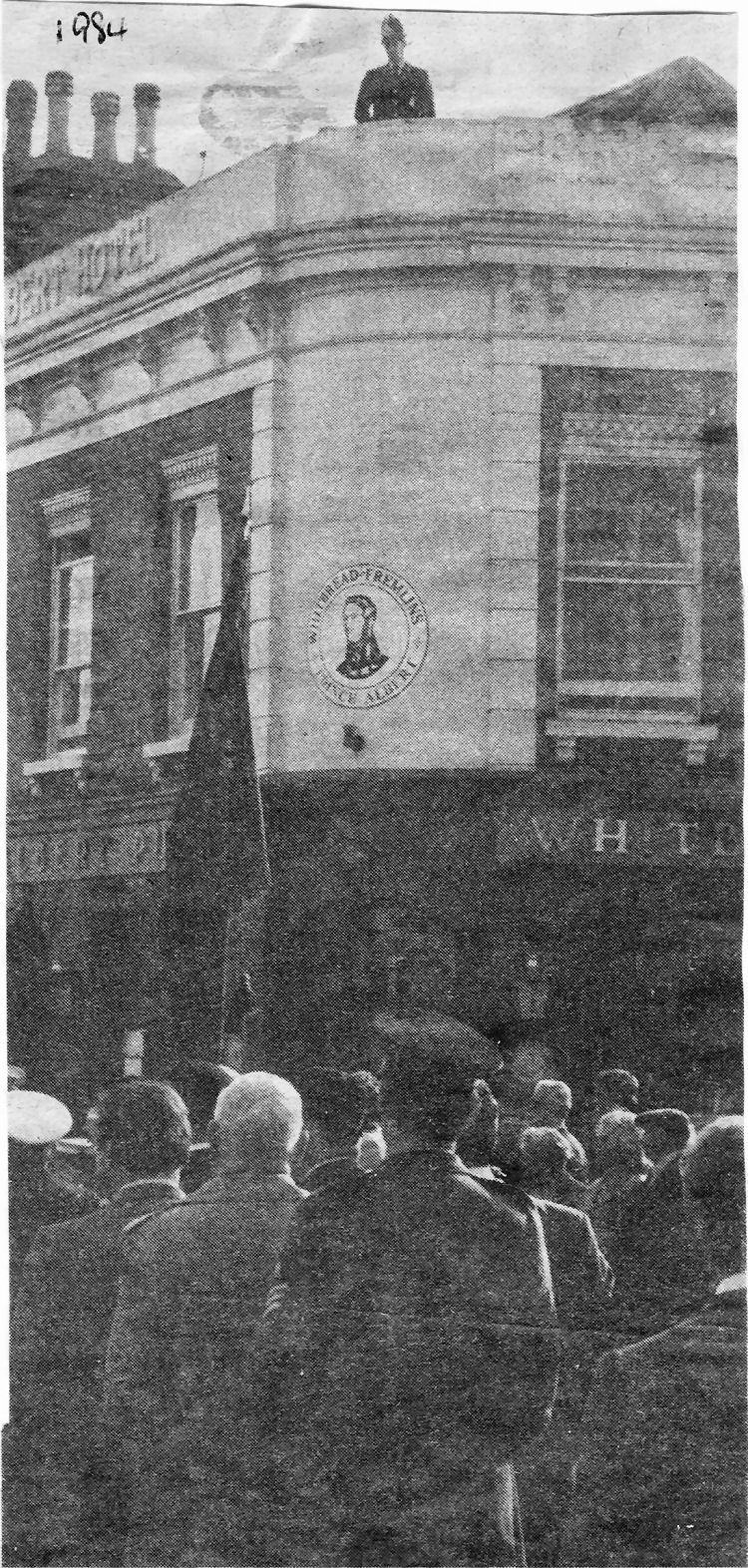 |
|
IN these, troubled times, a police-officer is delegated to watch over
the Remembrance Service from a vantage point on the Prince Albert.
November 1984. |
Certainly present in 1847 when it was under offer to let and it was also said to be there, at the top of
the street, in 1764, but I do not possess any concrete evidence to show this
as yet.
|
From the Kentish Gazette, 15 August 1843.
Lucky Escape.
On Wednesday, Mr. Ralph, of the "Prince Albert," having returned from
the country where he had been on business in a cart with a spirited
horse, left the same for an instant at his door, when the animal dashed
off at a furious rate up the Canterbury road, running over and killing
two fat sheep belonging to Mr. Webb, the butcher, and which happened to
be in the road at the time, near the New Town Hall. The horse continued
his career, galloping very fast—went through the two turnpike
gates—passed the Canterbury and Herne Bay coaches and omnibus, and was
only arrested in his progress at Ewell, where it ran against the corner
of the public house and upset the cart, when it was secured; astonishing
to say, without having caused injury to any man, woman, or child,
although the road in many places was thronged with numbers of the rising
generation; the animal itself was not hurt, neither did the cart nor
harness receive any damage whatever. The sheep were the only victims.
|
|
Kent Herald, 13 February 1845.
"Prince Albert Inn," Dover, to be Let, with Immediate Possession.
Coming in from £300 to £400; non but personal application will be attended to.
This is a convenient licensed public house, in the very center of the Borough of
Dover, which, when we consider its present and vast increase in magnitude, the
improvement to the harbour now going on, which considerably increases the daily
novelties of this interesting port, and the contemplated Harbor of Refuge, palls
the imagination to picture what Dover will be. This House, from its situation
and local advantages, maybe considered a nucleus, capable of attracting custom
in an exact ratio to the industry of the occupant. Is capable of vast
improvements, 16 years of the Lease are unexpired and has stabling, and a
Weigh-bridge and bridge-house attached, but distinct from, producing £60 or £70
per annum, equal to the outgoings, the rent being £40 per annum.
To treat for the same, apply personally to the premises, to Mr. T. J. Hiller,
Sen.
|
|
From the Dover Telegraph and Cinque Ports General Advertiser, Saturday, 17 July, 1847. Price 5d.
TO LET
To be Let, with immediate possession, THE PRINCE ALBERT INN, Near the
Maison Dieu.
With all the STABLING, LOFTS, &c., and the PATENT WEIGHING MACHINE, now
doing a good trade. For particulars enquire of the Premises.
|
|
Kentish Gazette, 23 March 1852.
On Tuesday afternoon Mr. Read, of the "Prince Albert," Biggin Street,
was accidentally thrown from a pony phaeton, and sustained several
severe contusions from the fall. A lad in his employ who was previously
driving met with a similar disaster some minutes before; and while Mr.
Read was attempting to catch the reins as they fell from the lad's
hands, he himself was precipitated from the vehicle.
Both were injured—the lad but slightly.
|
|
Kentish Gazette, 14 February 1854.
DEATH.
Welfare:- Feb 7, at Dover, Mr. George Welfare, landlord of the "Prince
Albert," which he had taken only three weeks before.
|
|
Dover Telegraph and Cinque Ports General Advertiser, Saturday 21 April 1855.
PRINCE ALBERT INN, NEAR THE GAOL, BIGGIN STREET, DOVER.
John Foster, who for the last fourteen yearn has had the management of
the Stable Department of the "Royal Oak Hotel,"
respectfully informs his Friends and the Public that he has taken the
above House, and trusts by attention to those who may honour
him with their patronages and the supply of articles of superior
quality, to merit a share of general favour.
Good and well-aired Beds, Wines, Spirits, Bottle and Draught Ales and
Porter.
GOOD STABLING,
The Guano Store and Patent Weigh Bridge will be attended to by the
Principal himself.
|
The number varies over the years as some of the
properties were rebuilt. That applied to this inn when it was purchased by
Burden from Barnett in July 1879. I am also under the impression that it was
rebuilt again in 1907 but my notes do nothing to confirm that.
From information I have received from Malcolm Kidby:- "In November 1842
Queen Victoria and Prince Albert visited Walmer Castle and stayed for
sometime and visited the surrounding area including Dover. There were many
celebrations and salutes not just on land, but by the Royal Navy and
fisherman private yachts etc. who were sheltering from a great storm at the
time which lasted for a number of days. To celebrate the unexpected visit
many townspeople decorated their properties and although there is no
specific mention this could well be the reason the Prince Albert was thus
named." That would infer that the house is even older, and would
have had another name then. I always keep an open mind. There was a pub
called the "Evening Star" that I have traced
from 1838 but no trace after 1842, operating from address of 50 Biggin
Street. Perhaps this was indeed this pub. The address of 50 Biggin Street
was also listed as being the "Three Tuns"
between 1792 to 1854. There is an error here somewhere that I haven't quite
got to the bottom of yet.
I have also been informed, but alas no proof, that prior to the pub being
called the "Prince Albert" it was known as the "Cross Roads." I am not sure
about the name of this as the roads are not quite what I would envisage as a
cross as one would depict it, and the name of "Cross Roads" most certainly
hasn't been found to date in the Dover area, or indeed to date on this web
site. Closest to that name I do know about is the "Cross
Keys" but that was on Custom House Quay. If the name Cross does come
into it at all, I would suggest that perhaps it was the "St.
Andrew's Cross" which is listed as being in Biggin Street in the 1545
records when Andrew Davey was licensee, but the building is certainly not
the same one we see today.
The executors of Walker sold for £800 in May 1859. A bit of local
excitement worth mentioning happened on 2 October 1889 when the bar was wrecked by an
explosion in the cellar.
Supplied by Alfred Leney Co Ltd, who bought out Thomas Walker's Phoenix
Brewery in 1859 and registered as such in 1896, until bought out by Fremlin
Brothers brewery of Maidstone in 1926, brewing at the Dover brewery ceased
in 1927, which later passed to Whitbread.
Serving Whitbread today, (1989) from one large bar which was the inspiration of
William Hagger in 1978.
|
South Eastern Gazette, Tuesday 9 July 1861.
Moldash. Melancholy Death.
During the period the East Kent Mounted Rifles were assembled at
Dover for training, in the course of last
month, and accident occurred to Mr. Chaney, of Moldash Farm, near
Ashford, one of the members of the corps,
on his return from drill, his horse stumbling, on turning the corner
of Biggin Street, leading to the "Prince
Albert" stables, and falling with him to the ground. One of Mr.
Chaney's feet was injured but no serious
consequences were at first apprehended. The case, however,
afterwards assumed a more serious aspect, and
notwithstanding the most skilful medical assistance, lock-jaw
supervened, and ended in Mr. Chaney's death. On
the occasion of his internment at Ashford, on Monday, the band of
the regiment and nearly every member of his
troops were present in token of their regards for his memory.
|
|
From the Dover Express and East Kent Intelligencer, 23
April, 1864.
SHOCKING SUICIDE
Yesterday (Friday) morning Mr. Wellard, the landlord of the "Prince
Albert Inn," Biggin Street, was found suspended in a loft at the rear of
his premises, life being extinct. An inquest was to be held last evening
by the borough coroner, W. H. Payr, Esq., but we publish too early to
give a report of the proceedings in our present issue.
|
|
From the Kentish Chronicle, 30 April, 1864.
SHOCKING SUICIDE.
W. H. Payn, Esq., coroner, held an inquest at the “Prince Albert Inn,”
Biggin street, Dover, on Friday evening, on the body of Mr. George
Wellard, the landlord of the “Prince Albert” who had that morning
committed suicide by hanging himself.
Henry Appleton, an ostler, stated
that on going up into a loft at the rear of the “Prince Albert,” shortly
before eleven o’clock on Friday morning, he saw deceased suspended by a
halter. He had seen deceased before breakfast, when his conduct appeared
very strange. The deceased had lately been addicted to intemperance.
P.C. Corrie cut the rope by which he was hanging and he then fell down
about four feet on the floor. Mr. Walter, surgeon, said he was called in
to see the deceased, who had hung himself, and on examination found the
deceased had died from strangulation about two hours before the body had
been discovered.
About a fortnight since he attended the deceased
professionally for threatened delirium tremens.
The jury returned a
verdict of “Temporary insanity.”
|
|
From the Dover Express and East Kent Intelligencer, 9
April, 1864.
DRUNK AND DESTRUCTIVE
Joseph Gambrell, a gunner in the 2nd Brigade Royal Artillery, was
charged with breaking two squares of glass at the "Prince Albert"
public-house, Biggin Street, and also with destroying a bed and rug at
the station-house.
Joseph Wellard, the landlord of the "Prince Albert", said, about nine
the previous evening the prisoner came to his house and called for a
glass of porter. He served him, and the prisoner (who was then too all
appearances sober) stood in front of the bar about half-an-hour smoking
his pipe. On going out, he fell against the window and broke two panes
of glass - not designedly, he thought, but through intoxication; an on
asking him if he were going to pay for the damage he had done, he said
he was not. He then put him out of the house, and in doing so the
prisoner slipped down on to the road. This seemed to exasperate him very
much; for he abused him (complainant) in a "tremendous" manner, and
afterwards wilfully broke three panes either with his fist or stick. He
was then given into custody of the police. The amount of damage
committed was 4s.
Police-constable Johnson proved the damage committed at the
police-station. When the prisoner was locked in his cell, there was in
it a bed and rug in good condition. About twelve o'clock the witness had
occasion to lock another prisoner in the same cell, when he found the
bed and rug torn to pieces. That morning the Superintendent asked the
prisoner why he did it, and he replied that they had no business to put
a drunken man in a place where there was anything destructible. The
prisoner was not so drunk when he was brought in as not to know what he
was about. He appeared more agitated than drunk. He was in the same
state when he awoke that morning and would have destroyed the iron
bedstead had he been able. The value of the bed and rug, which were the
property of the Corporation, was 5s.
The prisoner had nothing to say in answer to the charge.
The Bench fined him 16s. (including damages and costs) in respect to
the first charge, and 16s. (including damages and costs) in respect to
the second charge. In default he was committed to 28 days' hard labour.
|
|
From the Dover Express and East Kent News, Friday,
18 September, 1868.
DRUNKENNESS.
William Crawford was charged with being drunk and disorderly, and
assaulting the police in the execution of their duty on the previous
day. The prisoner was brought up handcuffed; but on being placed before
the Magistrates the handcuffs were removed.
Police-constable William Corrie: Yesterday, about half-past twelve
o'clock, the prisoner was on the pavement in Biggin Street, opposite the
"Prince Albert." he was quarrelling with his wife. I told him to go away
several times, as a crowd was collecting; but he refused, and on my
getting near him, he struck me in the breast. People were just leaving
church at the time, and the disturbance was very disgraceful. The
prisoner, though drunk, knew what he was about. With the assistance of
Sergeant Barton I took him to the police-station.
The prisoner had no questions to ask the policeman, and excused
himself on the grounds of having had an interview with his brother, a
soldier in the 4th, on the previous night. His brother had just come
home from Abyssinia, and as he (prisoner) had not seen him for eight
years, "of course" it was natural they should have some drink, and he
indulged rather too freely. He was making his way to Folkestone, when
his wife, who had also been drinking, became "outlandish," and he was
endeavouring to bring her to reason when the policeman interfered.
The Magistrates sent Crawford to prison for seven days, in default of
his paying a fine of 5s. and costs.
|
|
From the Dover Express and East Kent Intelligencer, 23 June, 1871. Price 1d.
ASSAULT
Benjamin Burville, a boatman, was summoned by Mary Ann Clark for
unlawfully assaulting her on the 16th inst.
Mary Ann Clark deposed: My husband is a boatman. Between one and two
o'clock last Friday I went to the “Prince Albert” public-house for my
husband. Defendant and my husband were disputing about a boat, when
defendant hit my husband, and a scuffle ensued. In the scuffle I pushed
the defendant, and then he struck me.
Prisoner: Did you not scratch my face first?
Witness: No, I only pushed you.
The husband of the plaintiff corroborated his wife's evidence. He said
that it was he himself who scratched the defendant's face, in his own
defence.
Prisoner: You called my mother a sot and all kinds of things.
William Burville, brother of the defendant, deposed: I was in the
“Prince Albert” with my brother last Friday, and I saw Clark there. He
was aggravating my brother, and he afterwards gave him a slap on the
face. Mrs. Clark called my mother a sot, and I am sure she was never a
drunkard.
Defendant was fined 2s. 6d. and costs.
|
|
From the Dover Express and East Kent News, Friday, 25 April, 1873.
ASSAULT – ISSUE OF A WARRANT
A summons had been issued charging a man named John Stokes with
assaulting Mrs. Barnes, the landlady of the “Prince Albert Inn,” Biggin
Street, on the 16th April; and as he did not appear, a warrant was
issued for his apprehension.
|
|
From the Dover Express and East Kent Intelligencer,
6 July, 1877. Price 1d.
CHARGE OF ASSAULT
George Thomas Bartholomew was summoned for assaulting William Jarvis,
of Folkestone, by knocking him down and striking him in the face, on the
30th June, at the "Prince Albert" public-house, in Biggin Street.
Mr. Sanders said it was a very bad assault, but the prosecutor was
not present.
Charles Handsall, private in the 10th Regt., said: On Saturday
evening, about a quarter past ten, I was at the "Prince Albert," in
Biggin Street. The prisoner was there with several others. As I was
standing in front of the bar, a disturbance arose, and I saw the
prisoner strike another man in the eye, causing blood to flow. The other
man had not provoked him in any way. The prisoner apologised to the man
for striking him when they were outside. The man gave him into custody.
Mr. Supt. Sanders said: On Saturday night the prisoner was brought to
the station with Police-constable Bailey, about 20 minutes past ten, and
charged with assaulting William Jarvis, who came with him to the
station, and signed the charge. He said, in the presence of the
prisoner, that he went to the back way of the "Prince Albert" from
Priory Street. He was first of all knocked down by a little tinkerman,
and on his return to the house the prisoner struck him in the face. The
prosecutor was bleeding from a cut over the right eye, his lip was very
much swollen inside, evidently from a blow in the teeth. The prisoner
admitted striking the man. Prosecutor signed the charge and promised to
attend here this morning. He is not in attendance.
The prisoner had been charged on similar offences before.
The Bench thought the prosecutor should be summoned to attend, the
Court could not be trifled with. The case was remanded until Friday.
|
|
From the Dover Express and East Kent News, Friday, 19 October, 1877. Price 1d.
A HUSBAND CHARGED WITH THREATENING TO MURDER HIS WIFE
Charles Parfett, landlord of the “Prince Albert,” was charged with
threatening to stab his wife, Charlotte Parfett, on the 14th inst., with
a knife which he then and there had in his hand.
Charlotte Parfett said: I am the wife of the defendant. I have been
married to him 14 years. We keep the “Prince Albert” public-house,
Biggin Street. On Sunday night a little past ten we went to bed. The
defendant was the worse for liquor. Between eleven and twelve o'clock he
became very restless and got out of bed three or four times. I obtained
a light to see what he wanted. I left the light burning. He got into bed
again and seemed quieter. Shortly after, he jumped up in the bed with
the knife produced in his hand and said “It has come to a crisis now.” I
snatched the knife from him and he fell back. The blade was open. I am
afraid from what he did on that occasion and from his previous threats
that he will do me some bodily harm.
Emma Parfett, daughter of the complainant, said since her father had
been home he had threatened to knock her mother's brain out, and they
were obliged to watch him, or they believed he would do her some injury.
In reply to Dr. Astley, the witness said her father had been home about
a fortnight. He had threatened her mother before, and they had been
obliged to send for the Police. He was drunk at the time.
By the defendant: I am sure you threatened mother.
The defendant said he had never threatened his wife, it was a great
story. He had the knife in his hand, but it was to cut some tobacco
with, and because his wife happened to see it she snatched it away and
ran into her daughter's bedroom, and said he was going to cut her
throat. The knife was only part of the way open.
Dr. Astley: Are you in the habit of smoking a pipe in the middle of the
night?
Defendant: Well, I am, if I cannot get to sleep.
Dr. Astley: There's another thing, according to your daughter's
evidence, you are in the habit of getting intoxicated?
Defendant: I do get a little worse for drink sometimes.
Dr. Astley: When you are in such a state do you know what you are doing?
Defendant: Sometimes I might not, but I am quite satisfied I did on this
night; I was not incapable.
The Bench said the defendant would have to find two sureties in the sum
of £50 each, to keep the peace between his wife for sixth months, and be
bound over in his own recognizance's of £100, if failing to find these
sureties, he would have to go below until he did.
|
|
From the Dover Express and East Kent News, Friday 21 December, 1878
DRUNK AND INCAPABLE
Elizabeth Amos was charged with being drunk and incapable, and with
causing an obstruction on the footway in Biggin Street.
Police-constable Bath said: I was on duty in Biggin Street about 20
minutes past 11 on Saturday night. I saw the prisoner there with a crowd
of about 30 young men. She was holding on the fence of the “Prince
Albert.” As I was dispersing the crowd, she fell, and struck herself on
the head, from which blood ran freely. I took her to Dr. Long's surgery,
where her wounds were dressed twice, but she tore the bandages and strap
off. I then took her into custody.
By the prisoner: You did not have a woman there who fell and broke her
leg. You were not capable of taking care of herself.
The Superintendent stated that 7s. 6d. had been incurred at the station
for doctor's fees, &c.
The bench fined her 10s. and the costs which, included the expenses
incurred, amounting to £1 3s. 6d.
The money was paid.
|
|
From the Dover Express and East Kent Intelligencer, 7 January, 1881. Price 1d.
DEATH BY SUFFOCATION
An inquest was held on Thursday afternoon at the “Prince Albert”
public-house, Biggin Street, before the Borough Coroner (W. H. Payne,
Esq.), on the body of a woman named Ann Young.
Mr. Burt was foreman of the Jury, and the body having been viewed, the
following evidence was adduced:-
George Young, labourer, of 2, Queen's Court, Biggin Street, said: The
deceased, Ann Young, was my wife, her age being 63 years. Her health had
not been good, having been under the doctor for the last 20 years, and
in the hospital nine months out of the twelve for the last six years.
She has been subject to dropsy. It is quite two months since we had a
doctor to her. I wished her to have the parish doctor, or go in
hospital, but she said she would not but would sooner jump out of the
window, and was determined to lie and die where she was. On Tuesday
morning I left the house about half-past five, giving her first cup of
tea, putting the food she would need during the day in the room, and
setting the fire, as she was unable to leave the house but could cross
the room and light it when she wanted it. I went to Waldershare to work,
and returned at night about half-past seven, and on going upstairs into
the bedroom, I found her kneeling beside the bed with her face buried in
the clothes, quite dead and cold. I went for a doctor who came shortly
after and said she was quite dead, but didn't tell me the cause of
death.
By the Foreman: She suffered through a very weak stomach, and the food
left for her was seldom eaten.
Dr. Simpson said: On Tuesday, evening about a quarter to eight, I was
called to see the deceased by the last witness, and found her in the
bedroom in a half kneeling position before the bed, her face being
buried in the bed-clothes, quite dead and cold. There were no marks of
violence, so I came to the conclusion that she had fallen through
weakness into that position, and was unable to move herself, and so
became accidentally suffocated. She smelt strongly of spirits, and there
was an empty bottle lying beside the bed which had contained whisky.
By the Foreman: There was nothing suspicious whatever about the body.
The Jury returned a verdict that the deceased accidentally died through
being suffocated in the bed-clothes while in a very weak state.
|
|
From the Dover Express and East Kent Intelligencer,
3 June, 1881. Price 1d.
APPLICATION
An application was made for an extension of time at the "Prince
Albert" public-house, Biggin Street, for a dinner.
The Bench would not grant the application, as it was a rule to allow
extensions for balls, &c., but not for dinners.
|
|
From the Dover Express and East Kent News, Friday, 26 October, 1888. Price 1d.
REFUSING TO QUIT LICENSED PREMISES
Cecelia Mary Elmar, a young woman respectably dressed, was charged with
being drunk and refusing to quit the “Prince Albert” licensed premises
when requested to do so.
Mary Ann Burden said her brother kept the “Prince Albert,” and she
resided there. The prisoner came into the house about two o'clock the
previous afternoon and asked for half a quartern of gin, which she took
away, and returned about five minutes afterwards and asked for a glass
of stout. Witness refused to serve her as she saw the prisoner was
drunk. She requested her to leave, but she refused, and witness
afterwards sent for a police constable, who had to take her into
custody, as she still refused to quit the house. The prisoner had on
several occasions previously caused a disturbance at the house.
Police-constable Nash proved moving the prisoner from the house. She was
drunk.
The Bench fined the prisoner 10s. and costs.
The money was paid by the prisoner's husband.
|
|
From the Dover Express and East Kent News, Friday, 4 October, 1889. Price 1d.
GAS EXPLOSION IN BIGGIN STREET
THE PRINCE ALBERT BAR WRECKED
On Wednesday evening about six o'clock, the inhabitants of Biggin Street
were startled by an explosion of gas which took place in the cellar of
the “Prince Albert Inn,” at the junction of Biggin Street and Priory
Road. The noise made by the explosion is variously described. One
person, who was standing by the “Red Cow” in Folkestone Road, said it
sounded like a cart load of crockery ware being upset. In the Police
station it sounded as though the Salvation Army drum had a smart blow in
front of the door. The neighbours opposite in Biggin Street, said it was
louder than the guns of the Royal salute which had been fired just
before, while others thought it was an earthquake. What it seemed like
to those in the house would be difficult to describe; for they were
rather too alarmed to collect their thoughts for a while. Miss Burden
and the two barmaids were standing where the greatest wreck occurred,
the shock, which they felt was terrific, but, fortunately, with the
exception of a cut in the face received by Miss Burton, they sustained
no injury. The cause of the explosion seems to have been in the cellar
right under the private part of the bar, where there comes up a pipe to
heat a beer muller. It seems that in putting barrels the connecting pipe
had been disturbed. A strong escape of gas was noticed shortly before
six, and Mr. R. Adams was sent for and asked if he would see what was
the matter. He went down into the cellar and temporarily stopped the
leak with soap, and then he lighted the gas, whereupon there was a
terrific explosion, which blew him across the cellar. Fortunately he
fell easily and was not hurt. The force of the explosion seemed to go
upwards, for the bar overhead and the little parlour at the back were
literally wrecked. The people in front of the bar as well as the
barmaids rushed for the street, where a large crowd immediately
collected, and very soon the most alarming rumours prevailed, it being
reported down the town that the wine, spirits, and beer were running
down the gutter in the street. The outside crowd had not so much to see,
with the exception of a window looking on Priory Road being broken, and
the deluge of liquor in the street was pure fiction. The house was
immediately shut up and everything was allowed to remain as the
explosion left it, until it had been inspected by the insurance agent.
We had a look inside before anything had been disturbed. The bar which
faces the junction of the two roads is horse-shoe shaped, and a part
next Priory Road is partitioned off as the jug and bottle department.
With the exception of this latter, the front of the bar did not seem to
have suffered much, but here the glass and white porcelain jars were
blown about in a manner that must have startled the jug and bottle
customers much more than it did if the explosion had occurred at the
time of serving out the supper beer. In looking over into the private
part of the bar the floor seemed to be heaped up with the debris of
broken bottles, decanters, cigar boxes, and large ornamental jars. The
effect of the explosion seems to have been peculiar. In one case half a
bottle of ginger beer was left standing on the inner edge of the bar,
the top half having been cut off clean, leaving the lower part quite
full. The heads of decanters were blown off, the remainder left
standing. The greatest wreck was in the little private room behind the
bar. The partition wall was ripped up and stripped of the plaster as
though it had been struck by lightening; all the furniture was blown
into confusion, pewter pots, silver coffee services, and glass ware lay
on the floor amongst a mass of laths and plaster, umbrellas, walking
sticks, and wearing apparel. The greatest wonder of all is that in such
an explosion there should have been the three bar attendants right in
the midst of it escaping comparatively unhurt.
|
|
From the Dover Express and East Kent News, Friday, 6 February, 1890. Price 1d.
APPLICATION
Mr. J. Burden, of the “Prince Albert Inn,” applied for, and obtained a
special license to supply refreshment at the Artillery Volunteer Ball,
on Monday night, at the Town Hall.
|
|
From the Dover Express and East Kent News, Friday, 16 October, 1891. Price 1d.
STEALING THREE GOLD LOCKETS
Charles Rasmond was charged with stealing three gold lockets, value £3,
the property of Mr. A. Luckhurst.
Albert E. Luckhurst, jeweller, 127, Snargate Street, said the prisoner
came into his shop between three and four o'clock on Monday afternoon.
He bought a watch, which he wished to have repaired. Witness went into
the room at the back of the shop to do this. He had been there two
minutes when he heard a noise like a case being opened. He went back to
see what was the matter, and heard a clock fall, which was damaged to
the extent of 7s. 6d. The clock was on the floor. Prisoner said he had
knocked it down accidentally, and offered to make good the damage. He
paid for the repairs to the watch, and said he would pay the money for
the damage on Friday. He also looked at some goods, which he said he
would purchase on Friday. In the evening witness missed three lockets
from the case on which the clock was standing. The lockets produced were
the same, and were worth £3. He gave the address of 13, Dour Street.
Witness gave information to the Police.
Edward William Windsor, provision dealer, Cannon Street, said prisoner
came into his shop on Monday afternoon. He was a customer. After serving
him, the prisoner produced the three lockets and said, “Here is a cheap
little lot,” and that he had just won them in a raffle, and cost him 1s.
6d., but were of no use to him. He asked him what he wanted for the
small one, and prisoner said 1s. Witness said it would do for a child,
and kept it till the Police came.
Thomas Francis, plumber, 11, York Street, said, that on Monday evening
the prisoner came to his house to see his wife. She had known him for
some time, and introduced him to witness who was talking to a gentleman
in the shop. After he was gone she showed him two lockets in the
presence of the prisoner, who said he had won them in a raffle for 1s.
6d., and that witness' wife's mother, with whom prisoner lodges, had
sent him over to witness to see if he would buy them for his little
girls. Witness bought them for 5s. he identified prisoner at the “Prince
Albert” yesterday. Prisoner had lodged at witness' wife's mother for
about three months, and seemed to have nothing to do.
By the prisoner: You were under the influence of drink on Monday.
Police-sergeant Suters said that on the previous afternoon, shortly
before three he was off duty. He went into the “Prince Albert.” He had
previously had charge of this case, and had recovered the three lockets
in the morning. The prisoner was in the bar, and asked to be allowed to
pay for witness' drink, and he then thought he answered the description
of the man witness was looking for. Witness said, “You will excuse me, I
want to go out into the back,” and then went and fetched Francis, who
identified prisoner as the man he bought the lockets from. Prisoner then
asked witness to have a cigar, and he replied, “No; the fact is, I am
going to take you into custody.” Prisoner asked what for, and witness
explained the charge. Prisoner said he was in liquor, or he would not
have done it. Witness took him into custody.
Sergeant Barton said they knew nothing of the prisoner, but he received
a weekly allowance from his mother.
The accused was sentenced to six weeks' imprisonment.
|
|
From the Dover Express and East Kent News,
15 January, 1937. Price 1½d.
PRACTICAL JOKE'S SERIOUS END
A practical joke by one of the guests at the Town Hall last Friday led
to his appearance at the Police Court on Monday on a charge of stealing a
bell, value 1s., from the "Prince Albert Hotel." The Chief Constable
stated that when the defendant came out of the public house he was seen
by P.C. Turner to take the bell out of his pocket and commence ringing it
and as a result of interrogation he was arrested for its theft but
admitted to bail. The Chairman of the bench, Mr. W. J. Barnes, told
defendant that he had acted very foolishly but the Magistrates were going
to be lenient and dismiss the case.
|
|
Dover Express, Friday 22 September 1939.
Breaches of Blackout Rules.
Helen Porter, of the "Prince Albert Hotel," Biggin Street, was also
fined 10s. when she pleaded guilty to a similar offence at 10 p.m. on
September 3rd.
Chief Inspector Saddleton said that a strong light was visible owing
to inadequate screening in the public bar window. The curtain was thick
enough, but insecurely fastened at the sides.
|
|
From the Dover Express and East Kent News, 26 January 1940.
BIGGIN STREET BUS SKID.
There was an alarming accident in Biggin Street on Wednesday, shortly
before 1 p.m. when an East Kent bus being driven towards the Post Office
got into a skid near the "Prince Albert" Hotel, in pulling out to avoid
obstructions. It slid across and mounted the pavement, the off-side
scraping along the wall of the "Prince Albert," but the driver Mr. J
Hatton, managed to turn it back into the road. Mrs. Watkins, of 29, Noah's
Ark Road, who was on the pavement walking towards the Town Hall, had a
remarkable escape from serious injury, although unfortunately, her left
wrist was fractured.
|
|
From the Dover Express and East Kent News, 2 January 1942.
FIFTEEN BOTTLES OF BEER.
At the Dover Police Court on Saturday before Mr. W. B. Brett and Mrs.
Morecroft.
Douglass Clapper (21) and Charles William Yarrington (21) soldiers,
were charged with being concerned together in stealing fifteen bottles of
beer, valued 13s. 6d., the property of Richard George Porter, from the
"Prince Albert" public house, on 26th December.
On application from an officer, defendants were handed over to be
dealt with by the Military Authorities.
|
|
Dover Express 10th May 1946.
Town, Port & Garrison.
The torrential rain early on Wednesday morning caused minor flooding and
the National Fire Service was engaged in pumping out basements at 10 and
12 Park Street, the Dovorian Restaurant, Market Square and the “Prince
Albert”, Biggin Street.
|
|
Dover Express 12th July 1946.
Town, Port & Garrison.
A three year old child, Leon Prescott of 21 Percival Terrace, struck by a
car outside the “Prince Albert” in Biggin Street on Saturday, sustained a
slight cut on the head.
|
|
Dover Express 16th July 1948.
FIREMEN OPEN A PUBLIC HOUSE BUT ONLY AS PART OF THEIR JOB.
When opening time for public houses arrived on Wednesday evening, the
manageress of the “Prince Albert” in Biggin Street, in charge during the
temporary absence of the landlord, was unable to open the front door.
While would-be customers waited, the barmaid made repeated efforts to
open the door, but, after half an hour, decided to call the Fire Brigade.
They arrived with a ladder and a fireman got through a bedroom window and
opened the door from the inside.
|
|
From the Dover Express and East Kent News, 29 January 1954.
Well-known Licensee Retires
"Prince Albert" Changes Hands.
After 24 years as licensee of the "Prince Albert" public house, in
Biggin Street, Mr. Richard George Porter has retired. Dover magistrates
on Monday agreed to the temporary transfer of the house to Mr. William
Herbert Scotcher.
Mr. Porter - who is well-known in the town especially for his work in
helping the former ex-Servicemen's Club - will continue to live in the
area.
Mr. Scotcher and his wife will not be unknown in Dover. Mrs. Scotcher
- before she married she was Miss Kathleen Tandy - lived for a number of
years in Dover, and when she was about nine resided in the house next
door to the "Prince Albert." Mr. Scotcher's mother was also a Dover
woman. For the past 18 years Mr. Scotcher has been carrying on business
as a fishmonger in Clapham.
|
|
From the Dover Express, 1st April 1999. By Peter Preston.
Police use spy cameras to trap thieving barman.
A DOVER barman caught stealing from the pub where he worked has been
jailed for nine months.
Canterbury Crown
Court ordered the sentence should run consecutively to a 15-month term
Anthony Green is already serving for stealing money from a building
society account belonging to Harry Cross, the man he was once employed
to look after.
Green, 33, appeared in court on Tuesday and
admitted stealing £100 from Roy Gilham at the Prince Albert, Dover, in
June last year.
Andrew Collins, prosecuting, said that soon after Green,
of Weavers Way, began working at the Prince Albert money began to go
missing. A surveillance camera was
installed in a cupboard where the till tray was put at night and Green
was filmed taking money.
When questioned he said he sometime took subs
in lieu of wages and said he had taken £10 for a taxi.
Mr Gilham said he
would not have loaned Green, who earned £74 a week, the £100.
Peter Alcock, for Green, said he regretted the way he treated Mr Cross
and admitted the theft.
Green had financial difficulties and there was
a system in the pub where employees could get money from the till in
lieu of wages and it was a temptation.
|
|
From the YourDover 17 November 2010
LIVE MUSIC ON OFFER AT TOWN CENTRE PUB.
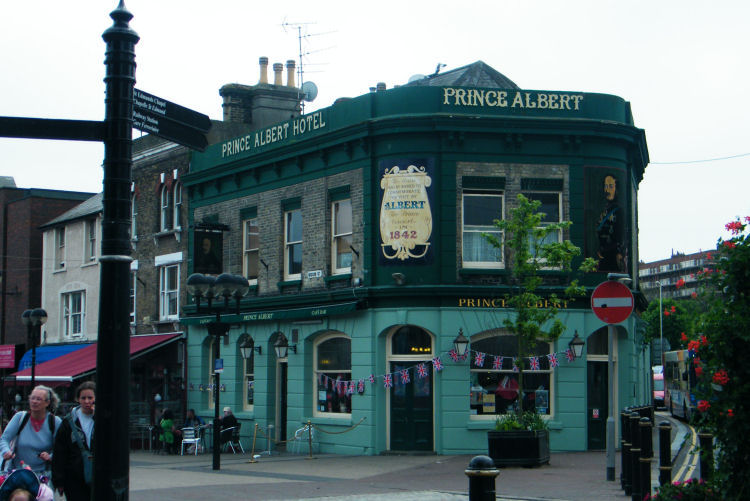
THE Prince Albert, in Dover, is a small town centre pub selling
beers, wine, spirits, cider, coffee etc.
We sell food, which is all home made on the premises, using fresh and
locally-sourced products.
The property is situated at the end of the precinct, opposite the
town council offices.
There is pavement on all sides, so we don't have the pleasure of a
garden or car park, but there are a couple of car parks in very easy
walking distance, 200 metres away at the most.
We were recently granted planning permission and installed a large
awning to one side of the pub, offering shelter for smokers.
Food on offer includes homemade soup of the day, with a fresh roll,
fresh fish in beer batter with hand-cut chips, rump or sirloin steak,
homemade burgers and cheesecake.
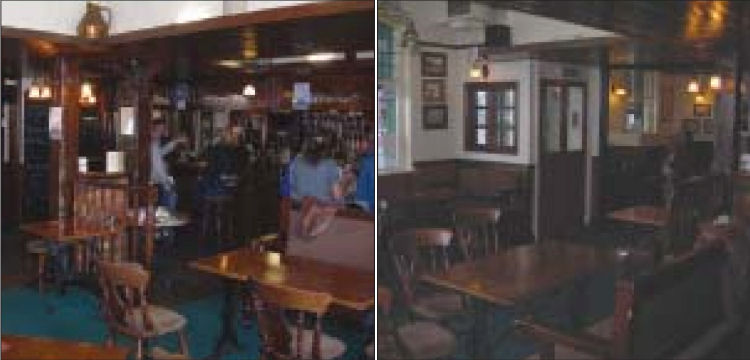
The pub is open in winter from 9am, usually until 11.30pm, but we are
licensed from 8 am until 2am, seven days a week. We serve food from 9am
to 9pm, seven days a week.
We are expecting to open at 8am in the summer and maybe serve food a
bit later, perhaps to 10pm.
Our staff are all dressed in uniform - dark green polo shirt with
their name on the front and Prince Albert on the back, along with black
trousers or skirt and black shoes.
We have table service, which is rare in pubs in this area, and is
usually reserved for restaurants or wine bars.
We have live music from 8.30pm every Sunday, and sometimes on a
Friday or Saturday evening as well.
|
|
From the Dover Express, Thursday, 10 February, 2011. 60p
REVISITING OUR NEGLECTED SITES
Pub stages interactive exhibition
Report by Kathy Bailes
A PHOTOGRAPHIC tour of forgotten sites in Dover is to be displayed
in a town centre pub.
The "Prince Albert" has commissioned Urban Decay, a trio of local
photographers dedicated to discovering the history of forgotten places,
to host an exhibition of photographs of hidden parts of Dover and the
surrounding district.
Spokesman Grog Mckenzie said; "All these pictures will leave you
wondering where they could be located. Many are walked past each day and
lay in silent memory to a courageous era in Dover's history.
"Some have fallen so far into neglect that not even being on the
Buildings at Risk Register can save them. They are gradually being
reclaimed by mother nature, end may soon be lost forever.
"This photographic tour will highlight just a small part of what is
hidden beneath your feel, and make you open your eyes to the lost parts
of your town."
During the showing of Abandoned Dover, from April 9 to April 16,
people will be able to view the photos both inside and outside the pub.
Much of the work on show will also be in themed frames, some made
from abandoned materials, others put in shapes by laser work at Sandwich
Technology School.
At the end of the week there will be a live graffiti demonstration at
which a local artist will produce an 8ft by 4ft picture of Dover castle.
The event is free.
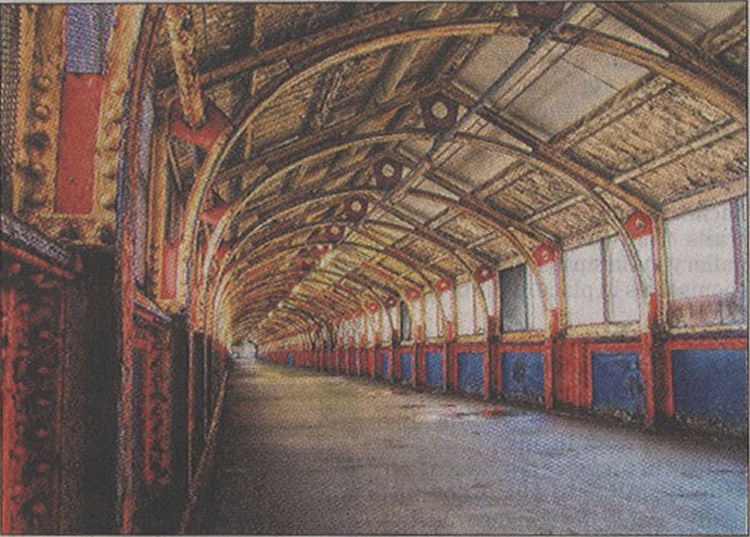
Above shows Urban Decay's stunning shot of the Admiralty Pier
walkway, which used to be the entrance to Western Docks station.
|
|
From the Dover Express, Thursday, 14 April, 2011. 60p
PHOTOS REVEAL THE FORGOTTEN SIDE OF DOVER
Report by Yamurai Zendera
A PHOTOGRAPHIC exhibition of forgotten sites in Dover has begun at
the "Prince Albert."
The Biggin Street pub is displaying the work of three Kent based
photographers known collectively as Urban Decay.
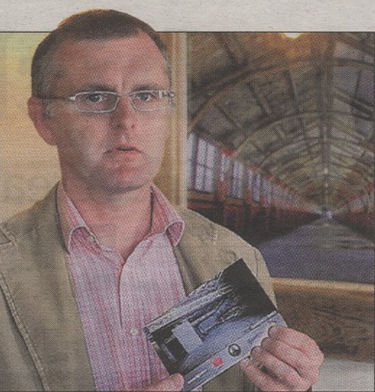
All this year, pals Greg Mckenzie, Tony Pullen and Daniel Yeates have
been taking pictures of old sites across the town.
When publican Steve Davies saw their work, he asked if they would like
to use the "Prince Albert" as a gallery.
Abandoned Dover features 37 pictures on display inside and outside the
pub. Some have been framed using driftwood and materials from charity
shops and rubbish skips.
Former St Edmund's pupil Greg said the aim is to show an alternative
view of Dover other than the port and castle.
He said: "There's lots of history hidden away. I'm not really interested
in taking countryside views, I'm more interested in capturing things
that are about to be pulled down or been left to rot.
The picture of the Admiralty Pier walkway has aroused most
interest, Greg added.
"People think it's all shut yet it's Open 2014+ if you want to
fish down
there," he said.
Greg is keen for people to contribute their own photographs to the
exhibition.
He said: "The pub is an open gallery. People should come down
and use it as their canvas."
Steve said he would like themed exhibitions to continue after this one ends
on Saturday.
He said: "Abandoned Dover is brilliant but I would like to see more
artists who are interested in putting some shows together. It would be
nice to have them running through the summer. It can be on anything."
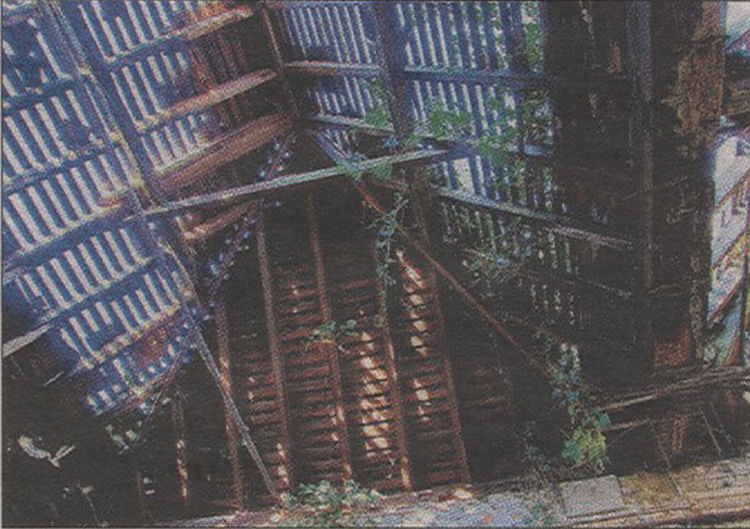
Above shows the roof of the old Army Recruiting Offices in Townwall
Street.
|
|
From the Dover Express, Thursday, 28 June, 2012. 65p.
DRUNK WOMAN TOLD TO BE BACK IN COURT NEXT DAY
A WOMAN who was too drunk to appear before magistrates was told to go
home and come back the next day when she was sober.
Catrina Tauden, 48, of Upper Road, Dover, got in trouble with police
after being told to leave the town centre on June 9.
Officers eventually issued a Section 27 notice, used to order people
away from a designated area to cut antisocial behaviour, and when she
returned to the town centre she was arrested.
Tauden was late for court on Thursday (June 21) and her solicitor Leanne James confirmed her client was apparently “the worse for
wear”.
She was brought before magistrates Paul Seward who ordered her to return
the following morning.
“Be here on time and make sure
you are sober,” he told her.
Last Friday, Tauden was back in court where she pleaded guilty to
failing to comply with the direction of a police officer.
The court was told members of the public and the landlord of the "Prince
Albert" pub had alerted
police. She has “numerous previous convictions for being drunk and
disorderly and like convictions,” the court heard.
Defending, Leanne James said her client is was “a lonely lady” who gets
trouble from local youths.
|
Was closed for a short time in 2018 but reopened again in January of 2019
after a refurbishment.
LICENSEE LIST
RALPH Mr 1843+
NIBLETT R B 1847

READ Mr 1852+
WELFARE George Jan-7/Feb/1854 dec'd (three weeks licensee)
FORSTER John Apr/1855-61+ (age 51 in 1861 ) )

WELLARD Joseph to Apr/1864 dec'd

WILLIAMS Daniel 1866-Oct/67

WELLARD George Oct/1867 (Of Canterbury)

BARNES William 1871-74 (age 46 in 1871 ) )

PARFITT Charles 1876
BURDEN John William 1881-91+ (age 36 in 1891 ) )
 
WRAIGHT G to Mar/1893

 CROFT George Lawrence Mar/1893-Feb/97
CROFT George Lawrence Mar/1893-Feb/97
 
 APPLETON Thomas Feb/1897-1901 and 1912
APPLETON Thomas Feb/1897-1901 and 1912
  
CONE J 1907
 APPLETON (Councillor) Thomas Nov/1912
APPLETON (Councillor) Thomas Nov/1912

WOOD Mr G Nov/1912+

NOAKES H 1914 end
PENNINGTON F C 1914-16
WARNER Walter B 1919-25 end
 
WILSON William George 1925-Aug/27

STEVENS Samuel Aug/1927+
 (Late of
H.M. Army) (Late of
H.M. Army)
PORTER Richard George 1930-Feb/54 end
 
SCOTCHER William Albert Feb/1954-57 end

MILLINGTON Edward Wilson 1957-62
POPPLE W 1964+
 RICH Kenneth J 1971-77 end
RICH Kenneth J 1971-77 end
 Whitbread Fremlins
Whitbread Fremlins
HAGGER William 1977-83 end
BURR Peter 1983-84 end
 GILHAM Ronald G 1984-2002+
GILHAM Ronald G 1984-2002+
DAVIES Steven 2010+
New licensee, name unknown as yet Nov/2011+
PAVELEY Debbie 2020+
The Dover Express reported that the temporary transfer from Councillor T.
Appleton to Mr. G. Wood, of Messrs. Leney and Co. would subsequently be
taken over by Mr. A. E. Ward.
 From Bagshaw Directory 1847 From Bagshaw Directory 1847
 From Melville's Directory 1858 From Melville's Directory 1858
 From the Post Office Directory 1874 From the Post Office Directory 1874
 From the Post Office Directory 1882 From the Post Office Directory 1882
 From Pikes Dover Blue Book 1895 From Pikes Dover Blue Book 1895
 From the Kelly's Directory 1899 From the Kelly's Directory 1899
 From the Post Office Directory 1901 From the Post Office Directory 1901
 From Pikes Dover Blue Book 1923 From Pikes Dover Blue Book 1923
 From Pikes Dover Blue Book 1924 From Pikes Dover Blue Book 1924
 From Pikes Dover Blue Book 1932-33 From Pikes Dover Blue Book 1932-33
 From Pikes Dover Blue Book 1948-49 From Pikes Dover Blue Book 1948-49
 Library
archives 1974 Library
archives 1974
 From the Dover Express From the Dover Express
|





















